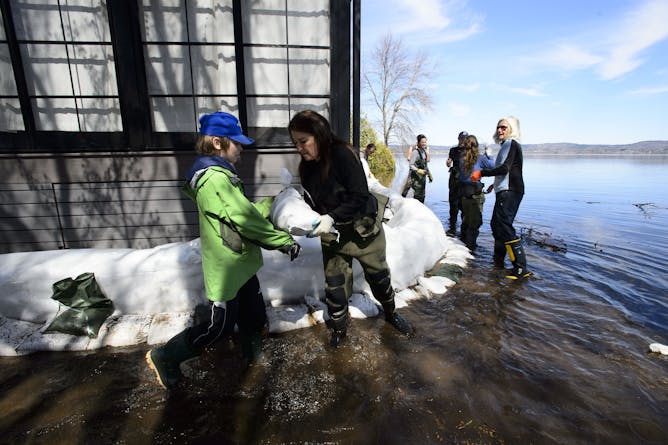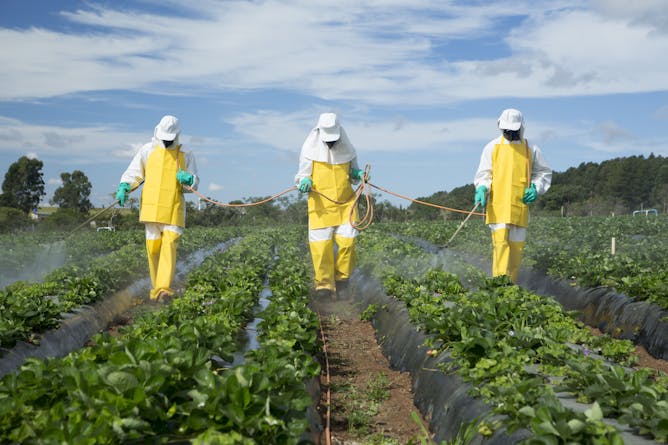|
If you live in a city with ride-share programs like Uber and Lyft, you know they have become an established part of the transportation system. But what if they suddenly disappeared – even temporarily? Today in The Conversation Canada, Arvind Magesan of the University of Calgary looks at the issues that have led to a planned strike on Wednesday by some drivers who feel they’re not cashing in from the “gig economy.”
That’s not all: Kyla Tienhaara of Queen's University tells us how the Green New Deal that started in the U.S. is going global; Sébastien Sauvé of the Université de Montréal explains the need for more research into pesticides that’s not supported by chemical companies; Kerri Finlay and Jackie Webb of the University of Regina look at the latest research on how farm ponds can be useful in combatting climate change.
And finally…climate-related disasters are in the news almost every day, often causing catastrophic property damage. Glenn McGillivray of Western University explores the impact of climate change on the insurance industry and shoots down the myth that severe weather will lead to the sector’s demise.
Regards,
|

Drivers for the ride-hailing giant Uber are planning a national day of action to protest labour conditions.
Dan Gold/Unsplash
Arvind Magesan, University of Calgary
Drivers for Uber, one of the most successful companies in the gig economy are set to strike by turning their apps off for one day this week as their company prepares for its IPO.
|

Residents, friends and volunteers work to hold back floodwaters on the Ottawa River in Constance Bay, Ont., earlier this week. THE CANADIAN PRESS/Sean Kilpatrick.
HE CANADIAN PRESS/Sean Kilpatrick
Glenn McGillivray, Western University
The unlikely failure of the catastrophe bond market won't trigger a financial crisis like the one a decade ago.
|

Farm ponds can act as greenhouse gas sinks.
Shutterstock
Kerri Finlay, University of Regina; Jackie Webb, University of Regina
New research finds that farm ponds actually capture nitrous oxide; this finding can be useful in combatting climate change.
|

Workers spray pesticides on strawberry fields. Most of the studies that examine the effects of pesticides are funded by the chemical’s producer.
(Shutterstock)
Sébastien Sauvé, Université de Montréal
Most studies on the use of pesticides are funded by those that produce the chemicals but only independent research can inform us about the best agricultural practices.
|

A recent poll suggests many Canadians support the idea of a Green new Deal.
Allan Lissner/flickr
Kyla Tienhaara, Queen's University, Ontario
The idea of the Green New Deal has been around for more than a decade. Why all the fuss about it now?
|

Éviter les arachides n'est plus la seule option pour les jeunes enfants souffrant d'allergies.
Shutterstock
Edmond Chan, University of British Columbia
L'immunothérapie orale est non seulement sécuritaire, mais elle est bien tolérée chez un grand nombre d'enfants d'âge préscolaire, constate une étude.
|
Environment + Energy
|
-
Suzanne O'Connell, Wesleyan University
A paleooceanographer describes her ninth sea expedition, this time retrieving cylindrical 'cores' of the sediment and rock that's as much as two miles down at the ocean floor.
|
|
Arts
|
-
David Callander, University of Cambridge; Rebecca Thomas, University of Cambridge
The original origins of some key characters names might give hints to their fates in Game of Thrones.
|
|
Science + Technology
|
-
Jonathan Ridley, Solent University
Leonardo's range of knowledge fascination with flying led directly to the development of modern aircraft, nearly four centuries later.
|
|